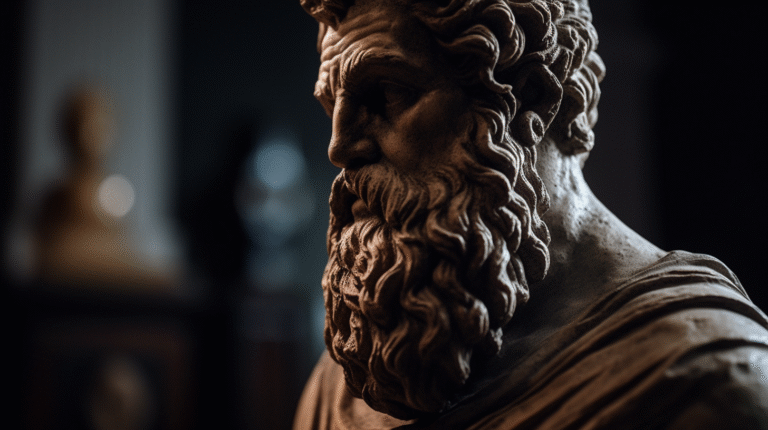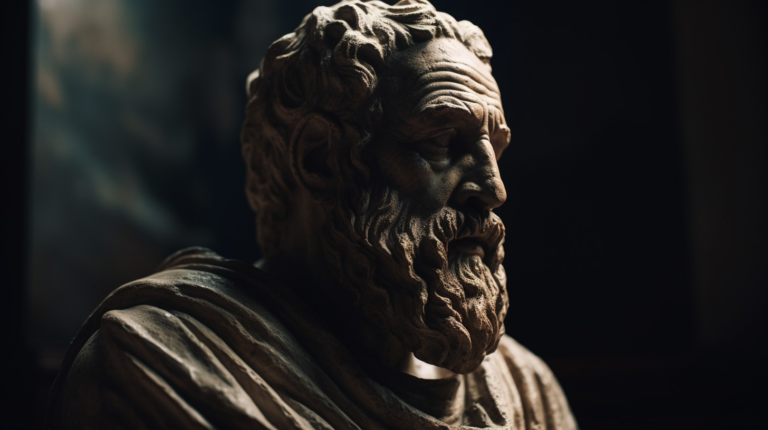The Socratic method, which bears the name of the eminent Greek philosopher Socrates, has proven to be a significant and enduring method of philosophical research. This introduction seeks to discuss the history of the Socratic method and how it works as a potent instrument for intellectual exploration and self-discovery in a warm and approachable manner in the manner of John Sellars.
Around the year 470 BCE, Socrates was born in Athens, the city-state at the height of its artistic, cultural, and intellectual splendor. Despite never having written any of his own writings, Socrates had a profound impact on philosophy and will always be remembered as a thought leader. Instead, the writings of his pupils, most notably Plato, have maintained his thoughts and teachings.
The Socratic method, also known as dialectic, is a technique of philosophical investigation that emphasizes the use of conversation and inquiry to explore difficult ideas and concepts. The Socratic approach involves participants in a process of critical thinking and self-examination as opposed to providing knowledge in a simple or didactic manner. Socrates would lead his interlocutors to examine their own presumptions, convictions, and values through a series of probing inquiries, frequently exposing contradictions or inconsistencies in their thinking.
The foundation of the Socratic method is the belief in the potency of personal exploration, a notion exemplified by Socrates’ famous declaration that he only knew his own ignorance. This statement highlights his dedication to maintaining intellectual modesty and the relentless quest for wisdom. Adopting such a mindset, Socrates inspired those engaging in conversation with him to examine their beliefs with a sense of wonder and receptiveness, thereby nurturing a culture of inquiry that has become a defining characteristic of philosophical investigation.
Central to the Socratic method is the conviction that the acquisition of wisdom and knowledge is most effectively achieved through active participation, as opposed to mere passive reception. By encouraging individuals to think deeply and scrutinize their own convictions, the Socratic method fosters a profound intellectual curiosity and personal evolution. This educational approach empowers people to assume responsibility for their intellectual growth, embracing the pursuit of wisdom as a continuous, lifelong journey.
“Truth is not what you want it to be; it is what it is. And you must bend to its power or live a lie.”
– Miyamoto Musashi
In this discussion, we’ll cover:
-
Socrates.
-
The Socratic Method.
-
Why the Socratic Method is still important today.
Socrates:
The Socratic Method and Socrates’ philosophy of questioning and self examination are now well over 2000 years old. However, despite its age, the ancient Greek art of questioning still holds a huge amount of value in the modern world that you and I share, and it can provide us with some of the best philosophical tools we can use to better our lives.
Socrates lived between 470 – 399 BC. He is often thought of as the grandfather of Western philosophy and the first true moral philosopher. Socrates wasn’t overly interested in many of the theoretical studies that captivated the minds of other philosophers of his time, his interests lay primarily in answering one simple question: “How can we live a better life.”
For Socrates, it was far better to focus on living a life of virtue than it was to focus on material wealth, status, or power.
He believed that the answer to this question of how to live a good life is hidden within you as an individual. It is your responsibility to examine your beliefs, values, expectations, assumptions, and perceptions. It’s your responsibility to care for your soul.
In doing so you develop your awareness of who you are as a person, and with a greater awareness comes a greater ability to question why you think the way you do.
All of this questioning ultimately allows you to find out what you believe, why you believe it, and then decide whether or not that particular belief is valid, or misleading. It also allows you to
I do nothing but go about persuading you all, old and young alike, not to take thought for your persons or your properties, but and chiefly to care about the greatest improvement of the soul. I tell you that virtue is not given by money, but that from virtue comes money and every other good of man, public as well as private.
– Socrates
Why We Still Need Socrates:
As we walk through life, we pick things up along the way. From the moment we’re born into the world kicking and screaming, we begin to form our own unique view of the world around us. This view of the world is formed in two ways:
-
We learn through experience
-
We learn through others
When we form beliefs based on our experiences, we draw on what we have personally seen, felt, or heard. The more often we experience the same thing, the stronger our beliefs about it become.
For example, if little Timmy touched a hot stove one day, he would burn himself and learn that hot stoves burn. This is a belief formed through experience. If this happens more than once, it reinforces the lesson and the belief.
Similarly, we can develop beliefs through others. For example, our ancestors would let one another know about poisonous plants, dangerous animals, and rough terrain to make sure that no one in their social group had to risk learning through experience. Without the ability for us to learn from other people, we would all have to make the same mistakes to figure out what is dangerous and what is safe.
The Risks:
There are risks that come with both learning through experience and learning from others.
Whether we learn from experience or other people, it is important to question the beliefs, values, and perspectives that we pick up along the way.
The beliefs that we learn or inherit are heavily influenced by the situation in which we learn them or the people that we learn them from. Unfortunately, this means that there is a certain amount of chance, or luck, involved in the influence we get from our environment.
Therefore, to prevent our own beliefs from being defined by chance, it’s our responsibility to develop an awareness of them, and then question them to make sure they are working for us rather than against us.
For example:
Bullying: if you grow up getting bullied or picked on, there’s a good chance you will develop low self esteem. This happens as a result of being told you’re worthless, weird, weak, etc, and then starting to believe those things yourself. However, in reality, bullying is less to do with the victim and more to do with the bully projecting his own insecurities and internal suffering onto an easy target. You can decide whether or not other people’s opinions of you define your opinion of yourself.
Prejudice: Growing up around people who are prejudiced to another group of people may mean that you will grow up thinking the same way, share the same beliefs, and judge people because of their group rather than their character. This is extremely common, and it’s our responsibility to examine what we believe about other people and decide whether or not our beliefs are reasonable.
So how can we do this? How do we examine our beliefs and change them? Below its The Socratic Method, one of the oldest and best ways of self examination and reflection.
The Socratic Method:
We can split the Socratic Method into roughly six parts. These parts, when done in sequence, can be used at any time when we are trying to reframe a thought or belief.
The Socratic Method has been used for thousands of years to help people rethink the way we see the world and weed out the negative, destructive, and limiting beliefs that can choke our happiness and well-being from within.
Here it is:
-
Identify what you are thinking
-
Why do I say that?
-
Explain in more detail what I mean.
-
What is my reaction to these thoughts?
-
-
Challenge the thought
-
Is this always true?
-
Under what conditions could this not be true?
-
What assumptions am I making?
-
Do I always have to react in this way to the thought?
-
-
Examine the facts behind your belief
-
Is my source reliable?
-
Is there any evidence to contradict it?
-
How do I know it to be true?
-
-
Look at it from a different angle
-
Is it possible for someone to see this in a different way?
-
What would be the counter argument?
-
-
Explore the Implications and Consequences
-
“But if…..happened, what else would result?”
-
“How does…affect…?”
-
-
Question the Question
-
“Why do you think that I asked that question?”
-
“Why was that question important?”
-
“Which of your questions turned out to be the most useful?”
-
We can then reflect on the questioning:
-
Did our perspective change? If so, which question helped us view it differently?
-
Did I learn anything about my thought process or biases?
The Broader Need For Socratic Questioning:
Culturally, we seem to be becoming increasingly poor at working through complex problems. This, in no small part, is due to our growing inability to participate in open discussion, respectful discourse, and debate.
Our ability to have conversations with one another is the most powerful tool we have for problem solving, and the importance of open communication becomes even more important with complex problems, and issues that involve a large number of people.
However, right now, at a time in which our social and political climate is growing ever more in noise, complexity, division, and mistrust, and at a time when, to me, we are in most need of objective, open, and frank discussion, there seems to be an active movement to shut down any discussion that might be uncomfortable, inconvenient, difficult, or challenging (basically the conversations needed to solve our biggest problems).
For me, the only chance we have to solve complex problems as a community, is to openly discuss them from as many avenues as possible in order to decide the best way forward.
The more we shut down discussion, the less people can understand and navigate our most complex concerns, and the larger that void in understanding grows, the more people will have to rely on approved media to fill it. Given the biased nature of modern media, this is a very dangerous situation to be in.
One of the best ways to help us work through complex problems and develop more rounded opinions of the world, ourselves, and other people is the Socratic method.
I went to the artisans, for I was conscious that I knew nothing at all, as I may say, and I was sure that they knew many fine things of which I was ignorant, and in this they certainly were wiser than I was. But I observed that even the good artisans fell into the same error as the poets; because they were good workmen they thought they knew all sorts of high matters, and this defect in them overshadowed their wisdom.
– Socrates






